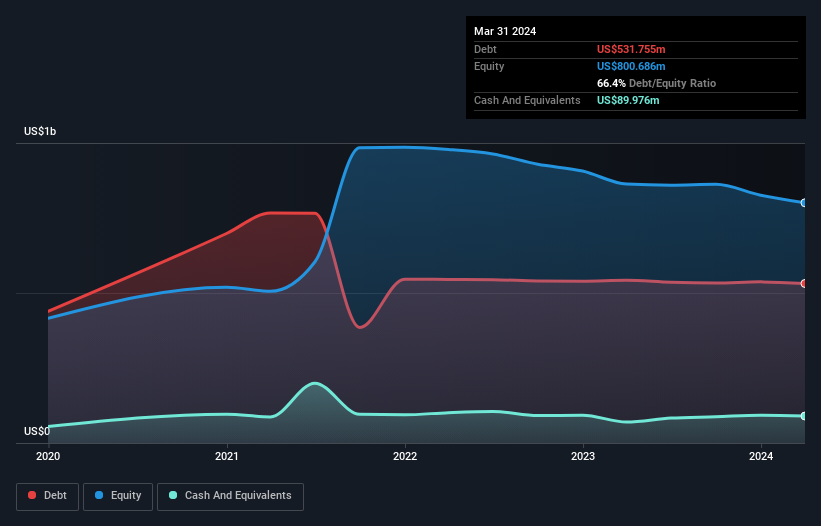- United States
- /
- Software
- /
- NasdaqGS:EVCM
Does EverCommerce (NASDAQ:EVCM) Have A Healthy Balance Sheet?
Some say volatility, rather than debt, is the best way to think about risk as an investor, but Warren Buffett famously said that 'Volatility is far from synonymous with risk.' So it seems the smart money knows that debt - which is usually involved in bankruptcies - is a very important factor, when you assess how risky a company is. We note that EverCommerce Inc. (NASDAQ:EVCM) does have debt on its balance sheet. But the real question is whether this debt is making the company risky.
Why Does Debt Bring Risk?
Generally speaking, debt only becomes a real problem when a company can't easily pay it off, either by raising capital or with its own cash flow. In the worst case scenario, a company can go bankrupt if it cannot pay its creditors. However, a more usual (but still expensive) situation is where a company must dilute shareholders at a cheap share price simply to get debt under control. Having said that, the most common situation is where a company manages its debt reasonably well - and to its own advantage. When we think about a company's use of debt, we first look at cash and debt together.
Check out our latest analysis for EverCommerce
How Much Debt Does EverCommerce Carry?
The chart below, which you can click on for greater detail, shows that EverCommerce had US$531.8m in debt in March 2024; about the same as the year before. However, because it has a cash reserve of US$90.0m, its net debt is less, at about US$441.8m.

How Strong Is EverCommerce's Balance Sheet?
We can see from the most recent balance sheet that EverCommerce had liabilities of US$113.9m falling due within a year, and liabilities of US$568.0m due beyond that. Offsetting this, it had US$90.0m in cash and US$64.4m in receivables that were due within 12 months. So its liabilities total US$527.5m more than the combination of its cash and short-term receivables.
While this might seem like a lot, it is not so bad since EverCommerce has a market capitalization of US$2.01b, and so it could probably strengthen its balance sheet by raising capital if it needed to. However, it is still worthwhile taking a close look at its ability to pay off debt.
We use two main ratios to inform us about debt levels relative to earnings. The first is net debt divided by earnings before interest, tax, depreciation, and amortization (EBITDA), while the second is how many times its earnings before interest and tax (EBIT) covers its interest expense (or its interest cover, for short). The advantage of this approach is that we take into account both the absolute quantum of debt (with net debt to EBITDA) and the actual interest expenses associated with that debt (with its interest cover ratio).
While EverCommerce's debt to EBITDA ratio (4.0) suggests that it uses some debt, its interest cover is very weak, at 0.53, suggesting high leverage. In large part that's due to the company's significant depreciation and amortisation charges, which arguably mean its EBITDA is a very generous measure of earnings, and its debt may be more of a burden than it first appears. It seems clear that the cost of borrowing money is negatively impacting returns for shareholders, of late. One redeeming factor for EverCommerce is that it turned last year's EBIT loss into a gain of US$20m, over the last twelve months. When analysing debt levels, the balance sheet is the obvious place to start. But it is future earnings, more than anything, that will determine EverCommerce's ability to maintain a healthy balance sheet going forward. So if you want to see what the professionals think, you might find this free report on analyst profit forecasts to be interesting.
Finally, a company can only pay off debt with cold hard cash, not accounting profits. So it is important to check how much of its earnings before interest and tax (EBIT) converts to actual free cash flow. Happily for any shareholders, EverCommerce actually produced more free cash flow than EBIT over the last year. There's nothing better than incoming cash when it comes to staying in your lenders' good graces.
Our View
EverCommerce's interest cover was a real negative on this analysis, although the other factors we considered were considerably better. There's no doubt that its ability to to convert EBIT to free cash flow is pretty flash. When we consider all the factors mentioned above, we do feel a bit cautious about EverCommerce's use of debt. While we appreciate debt can enhance returns on equity, we'd suggest that shareholders keep close watch on its debt levels, lest they increase. We'd be motivated to research the stock further if we found out that EverCommerce insiders have bought shares recently. If you would too, then you're in luck, since today we're sharing our list of reported insider transactions for free.
At the end of the day, it's often better to focus on companies that are free from net debt. You can access our special list of such companies (all with a track record of profit growth). It's free.
Valuation is complex, but we're here to simplify it.
Discover if EverCommerce might be undervalued or overvalued with our detailed analysis, featuring fair value estimates, potential risks, dividends, insider trades, and its financial condition.
Access Free AnalysisHave feedback on this article? Concerned about the content? Get in touch with us directly. Alternatively, email editorial-team (at) simplywallst.com.
This article by Simply Wall St is general in nature. We provide commentary based on historical data and analyst forecasts only using an unbiased methodology and our articles are not intended to be financial advice. It does not constitute a recommendation to buy or sell any stock, and does not take account of your objectives, or your financial situation. We aim to bring you long-term focused analysis driven by fundamental data. Note that our analysis may not factor in the latest price-sensitive company announcements or qualitative material. Simply Wall St has no position in any stocks mentioned.
About NasdaqGS:EVCM
EverCommerce
Provides integrated software-as-a-service solutions for service-based small and medium-sized businesses in the United States and internationally.
Adequate balance sheet and fair value.
Similar Companies
Market Insights
Weekly Picks


The "Physical AI" Monopoly – A New Industrial Revolution

Czechoslovak Group - is it really so hot?


The Compound Effect: From Acquisition to Integration
Recently Updated Narratives


UnitedHealth Group's Future Revenue Grows by 3.59%: What Will It Mean?


Why EnSilica is Worth Possibly 13x its Current Price


MINISO's fair value is projected at 26.69 with an anticipated PE ratio shift of 20x
Popular Narratives


Is Ubisoft the Market’s Biggest Pricing Error? Why Forensic Value Points to €33 Per Share


Analyst Commentary Highlights Microsoft AI Momentum and Upward Valuation Amid Growth and Competitive Risks


NVDA: Expanding AI Demand Will Drive Major Data Center Investments Through 2026
Trending Discussion

When was the last time that Tesla delivered on its promises? Lets go through the list! The last successful would be the Tesla Model 3 which was 2019 with first deliveries 2017. Roadster not shipped. Tesla Cybertruck global roll out failed. They might have a bunch of prototypes (that are being controlled remotely) And you think they'll be able to ship something as complicated as a robot? It's a pure speculation buy.



